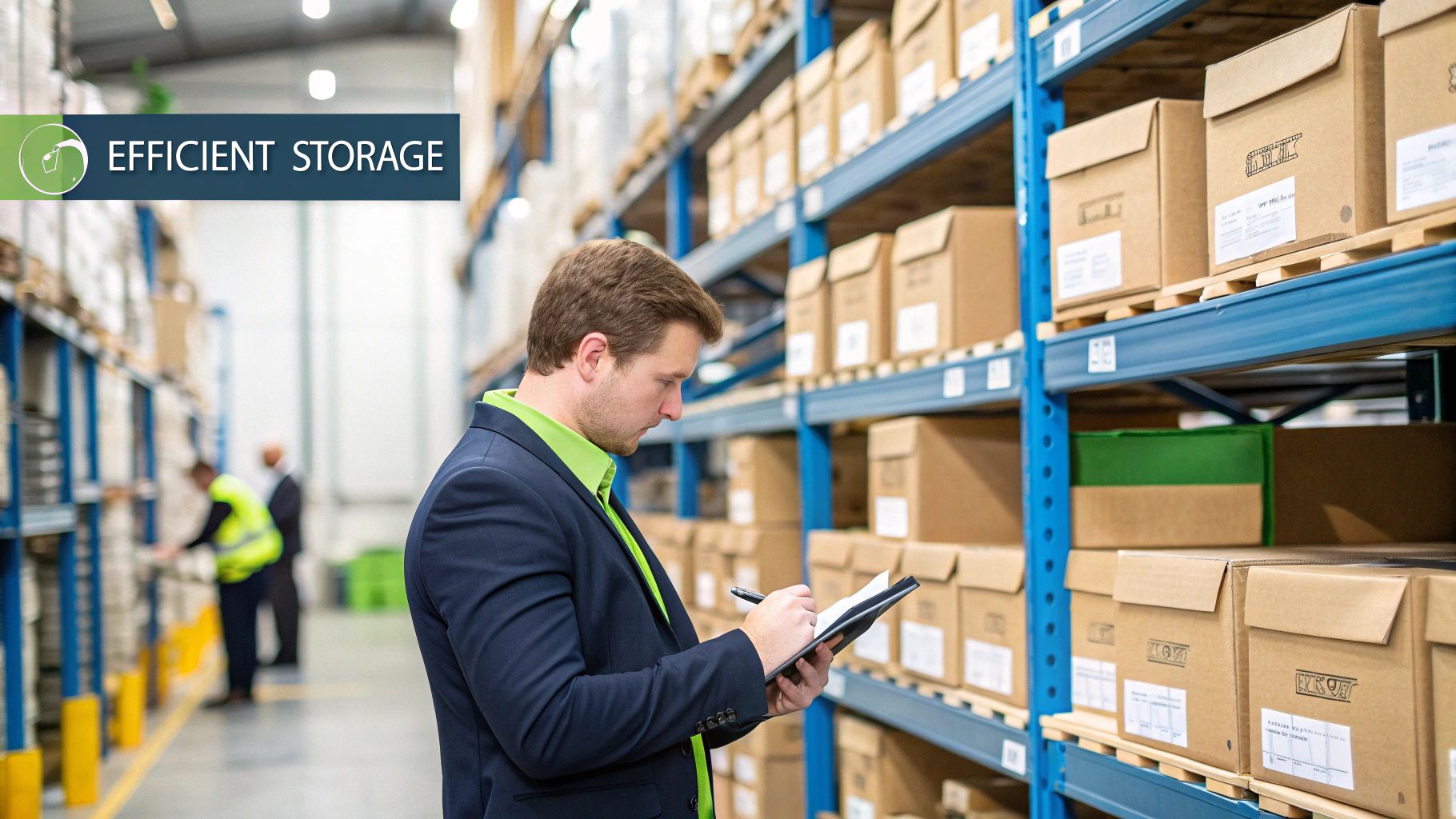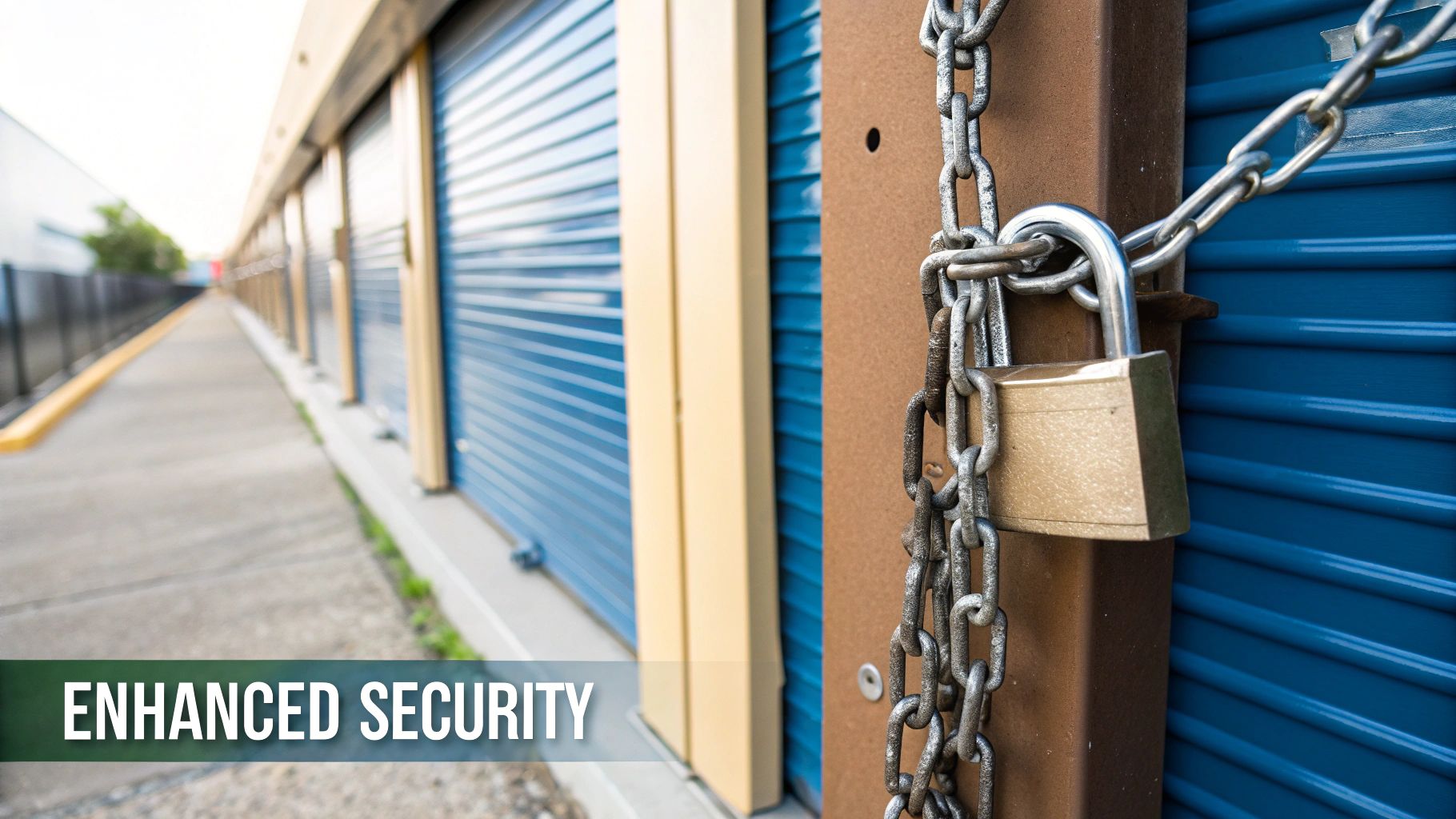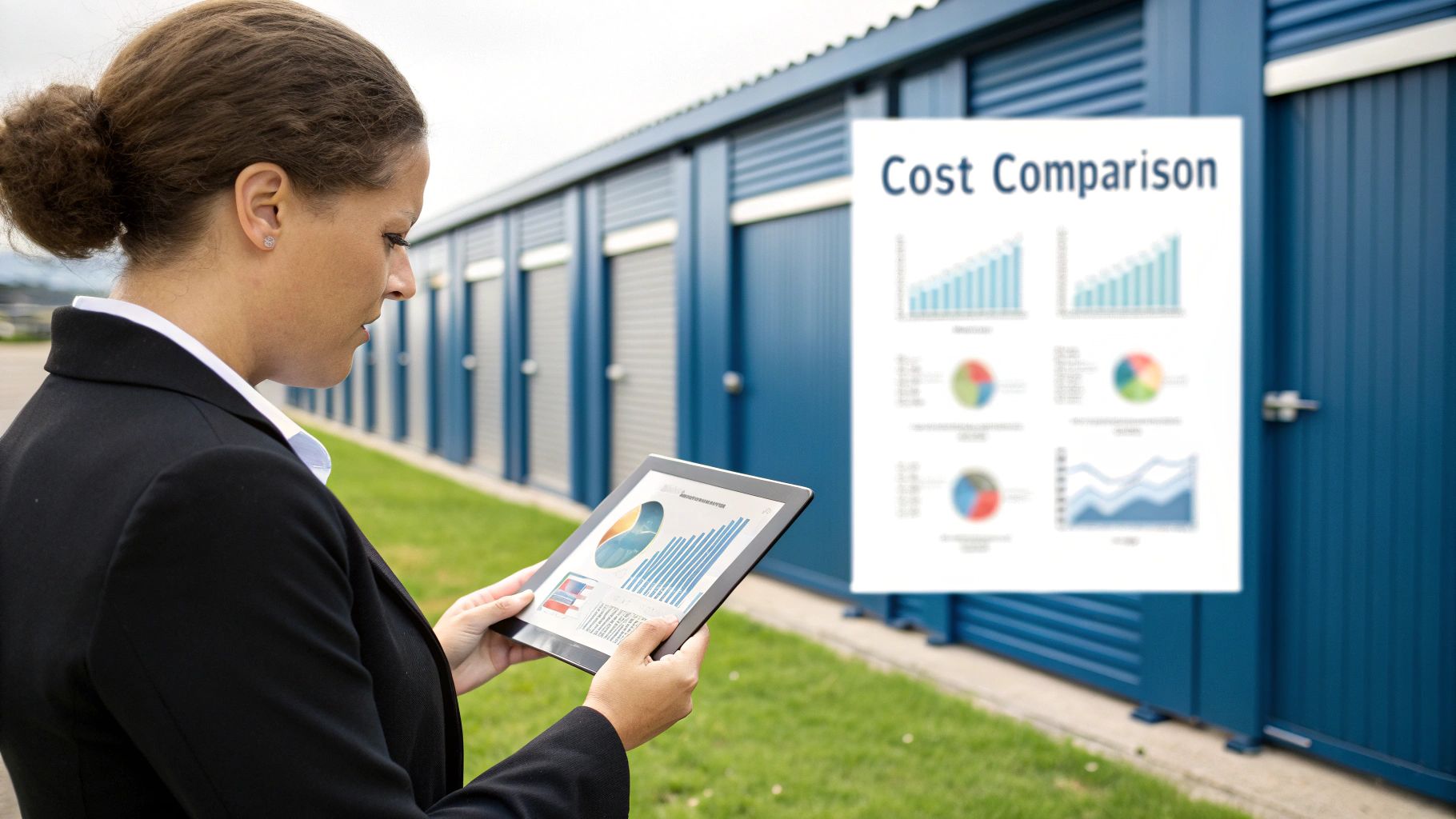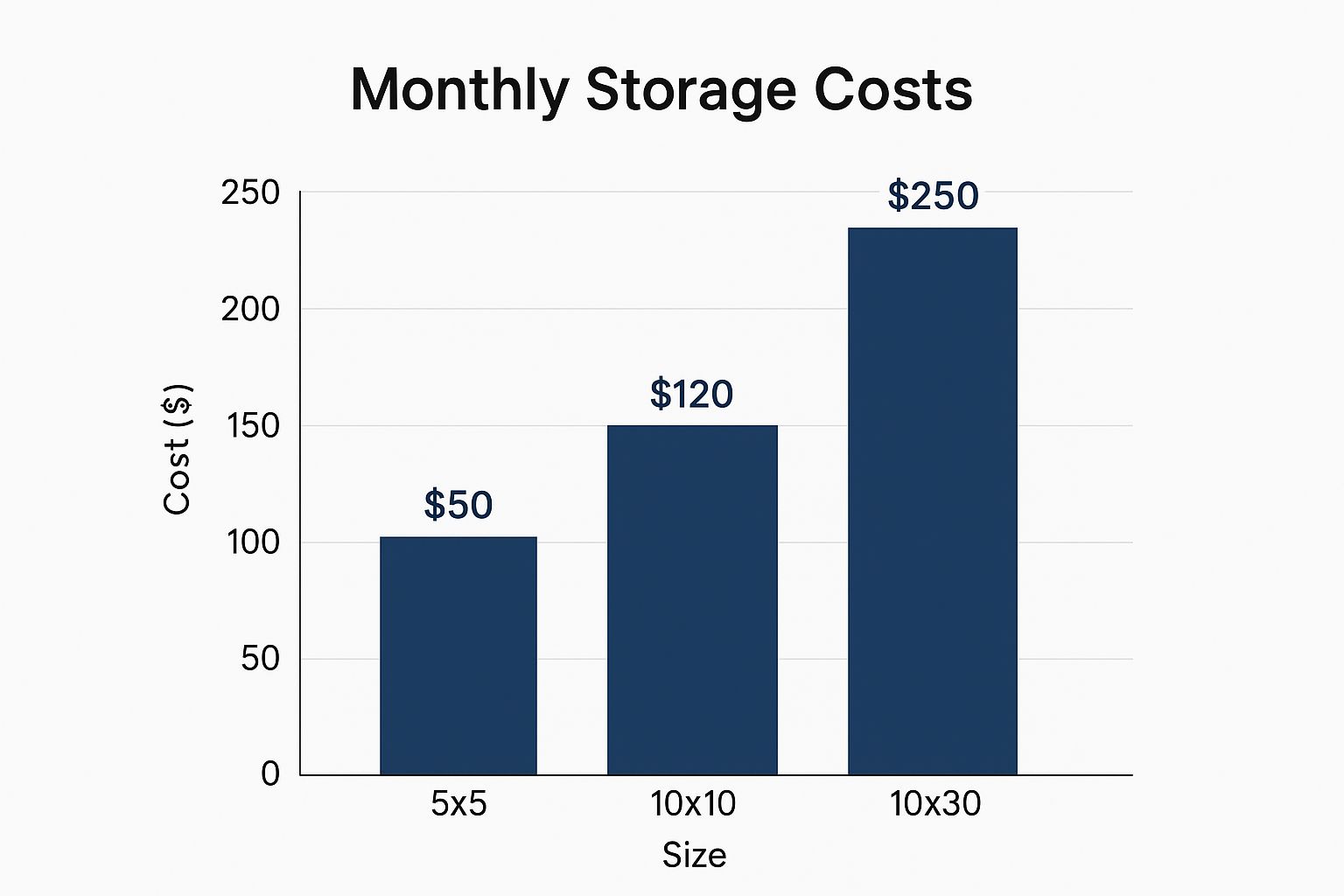For a lot of UK businesses, the search for "business storage units near me" isn't just about clearing out a cluttered office. It's a savvy move to gain flexibility, secure valuable assets, and grow without being tied to a crippling long-term commercial lease. A local unit can become a mini-warehouse for fluctuating stock, a safe lock-up for expensive tools, or even a low-cost operational hub.
Why Smart UK Businesses Are Using Local Storage



Ever wondered why the van for the local plumber or that online seller is always parked at a self-storage facility? It's a calculated decision. For countless SMEs, e-commerce retailers, and tradespeople across the UK, a nearby storage unit has become a genuine competitive advantage.
Think about an online retailer in Bristol. They need to ramp up stock for the Christmas rush but have nowhere to put it. A local unit offers instant, affordable space for that peak season. Or consider a building contractor in Leeds who can securely store thousands of pounds worth of tools overnight instead of leaving them vulnerable in a van.
It's More Than Just Four Walls
The best way to think about a modern business storage unit is as an extension of your own premises, not just a locked box. Once you realise that, you start to see the true value. The benefits of using self storage for your business are tangible and can have a direct, positive impact on your efficiency and bottom line.
Here’s what it really boils down to:
- Cost-Effectiveness: You get the space you need for a fraction of what you'd pay for a traditional warehouse or a larger office. Depending on size, you could be looking at monthly fees from as little as £50 to over £300.
- Proper Security: Professional facilities offer layers of protection like 24/7 CCTV, gated electronic access, and individually alarmed units—far more robust than a simple lock-up at your premises.
- Unmatched Flexibility: Short-term, rolling contracts mean you can scale your space up or down as your business dictates. This agility is a world away from the rigid, long-term commitment of a commercial lease.
This guide is designed to help you bypass the jargon and focus on what really matters. We’ll walk through a practical framework for finding a unit that genuinely works for your business, making sure you end up with a solution that's both secure and sensible for your budget.
Defining Your Actual Storage Needs



Before you even start searching for "business storage units near me," it’s crucial to take a step back and figure out precisely what you need. It’s tempting to jump straight in, but without a clear plan, you'll either end up paying for a unit that’s too big or full of features you don’t use, or worse, one that doesn't properly protect your assets. A little organisation now will save a lot of headaches later.
First things first, get a handle on what you’re actually storing. Are we talking about sensitive electronics that need a stable, climate-controlled environment? Or is it heavy-duty equipment and materials that just need to be kept dry and locked up tight? Your answer will fundamentally change your search criteria.
Then, think about access. For an e-commerce business, 24/7 availability might be a dealbreaker for those late-night packing sessions to meet next-day delivery deadlines. On the other hand, a solicitor’s office archiving old case files might only need access during standard business hours, which could open up more cost-effective options.
Real-World Business Scenarios
Let’s put this into practice with a couple of common examples. A local builder needs a secure lock-up for their tools, ladders, and bags of cement. For them, the priorities are simple: drive-up access to easily load the van, solid security, and a tough ground-floor unit. They have no need for climate control, so paying for it would be a waste.
Now, consider an online clothing retailer. They're dealing with seasonal stock and delicate fabrics, which are highly susceptible to damp and temperature swings. A clean, climate-controlled unit isn't a luxury; it's an absolute necessity to protect their inventory. They'll also need good lighting for stock checks and enough space to set up some basic racking. Understanding the full scope of options by researching comprehensive storage solutions is key to getting this right.
Taking the time to create a detailed checklist of your needs—from item sensitivity to access patterns—ensures you select a unit that functions as a true business asset, not just a storage box. This foresight prevents costly mismatches down the line.
Not sure exactly how much space you'll need? It can be tricky to eyeball it. A good starting point is to use a dedicated https://admiralsyard.co.uk/self-storage-calculator/ to get a much more accurate estimate based on your inventory. This simple tool helps you visualise the square footage required, making sure you only pay for what you'll actually use.
Evaluating Security, Access, and Essential Features



When you first tour a potential storage facility, it’s easy to get sidetracked by the clean corridors and tidy reception area. But the real value for your business isn't in the aesthetics—it’s in the details that protect your assets and make your life easier. You need to look past the fresh paint and focus on the security infrastructure.
A single padlock on your unit door simply isn't enough. Real security is a layered system, and it's your job to check how deep those layers go.
When you're on-site, ask direct questions. Is the entire property secured with a perimeter fence? How is entry managed? Top-tier facilities have moved beyond a simple gate key. They use PIN-coded systems that not only control who gets in but also create a detailed log of all activity. To see how this works in practice, you can find out more about the security benefits of a modern electronic access gate fitted for security.
More Than Just a Lock and Key
A solid security setup relies on several components working together. As you compare your options, keep an eye out for these crucial features:
- Comprehensive CCTV Coverage: Don’t just settle for a camera at the main entrance. The best sites have cameras monitoring all corridors, loading areas, and along the entire perimeter.
- Individually Alarmed Units: This is a big one. An alarm on your specific unit provides an immediate alert if someone tries to force it open—something a general hallway camera could easily miss.
- Good On-Site Lighting: A well-lit facility is a powerful deterrent. Make a note of how bright the property is, especially if you think you’ll need to access your unit after hours.
Features That Offer Real Business Value
The right amenities can turn a storage unit from a simple box into a genuine extension of your workspace. These aren't just nice-to-haves; for many businesses, they are essentials.
For a tradesperson, having access to a power socket to charge tool batteries overnight is a game-changer. For an e-commerce business, reliable on-site Wi-Fi means you can update your inventory system right from the unit the moment a new shipment arrives. It’s about seamlessly connecting your physical stock with your digital operations.
This demand for more than just space is driving huge growth in the UK self-storage industry, which now sees an annual turnover of around £1.2 billion. In fact, a staggering 68% of storage providers are now investing in new technology to meet these evolving business needs.
Prioritise features that directly support your workflow. Climate-controlled units for sensitive documents, on-site Wi-Fi for inventory management, and accessible power for tools aren't just perks—they are operational necessities that justify the investment.
Getting the Size and Price Right
Choosing the right storage unit is a bit like a game of Tetris for your business assets. Get it wrong, and you're either paying for air or cramming everything into a space so tight you can't find what you need. Getting this right is the single biggest factor in keeping your storage costs in check.
A small e-commerce seller, for example, might find a 50 sq ft unit is the perfect home for their stock and shipping supplies. On the other hand, a landscape gardener with bulky mowers, tools, and seasonal equipment will probably need something closer to 150 sq ft to keep everything organised and accessible.
To give you a better idea of what you might need, here’s a breakdown of common unit sizes and their typical business applications.
Typical Business Storage Unit Sizes and Use Cases
| Unit Size (sq ft) | Typical Business Use Case | Estimated Monthly Cost (GBP) |
|---|---|---|
| 25 – 50 sq ft | Perfect for document archiving, excess office supplies, or a small e-commerce business's inventory. Think of it as a large walk-in wardrobe. | £50 – £100 |
| 75 – 100 sq ft | Ideal for a tradesperson storing tools and materials, or for a growing retailer needing more stockroom space. Roughly the size of a single garage. | £100 – £180 |
| 150 – 200 sq ft | Suits businesses with larger equipment, such as construction firms or event companies. Also great for palletised goods or extensive furniture storage. | £180 – £300+ |
As you can see, the costs climb quickly with size, which makes that initial assessment so critical. The infographic below further illustrates how these spaces can be used.



This visual guide helps connect the square footage to real-world business items, making it easier to visualise what you truly need before you start paying for it.
Look Past the Shiny Introductory Offer
It’s easy to be drawn in by a low introductory price. We've all seen them—"50% off for the first 8 weeks!" While these deals can provide a nice initial saving, the real cost is often waiting just around the corner.
The standard rate that kicks in after the promotion can be a serious shock to your budget if you haven't planned for it.
Before you sign on the dotted line, make a point of asking for the standard, non-promotional monthly rate. This is the only figure that matters for long-term budgeting and will save you from a nasty surprise a few months down the road.
To get the full picture when comparing quotes, make sure you get clear answers to these questions:
- The Standard Rate: What will I be paying per month once the initial offer ends?
- Insurance: Is business contents insurance required, and what does it add to the monthly bill?
- Other Charges: Are there any one-off admin fees, deposits, or costs for mandatory high-security locks?
Getting this information upfront means you can compare options on a like-for-like basis and budget with confidence, knowing the price you see is the price you'll actually pay.
Finalising Your Choice and Moving In
You’ve done the legwork and narrowed your search for "business storage units near me" down to a couple of strong contenders. Now for the crucial part: visiting them in person. Honestly, there's no substitute for walking the grounds yourself to get a real feel for the place.
This is your chance to gauge the professionalism of the on-site staff, see the actual condition of the units, and test out the security features firsthand. Pay close attention to the small things, like how clean the corridors are and how well-lit the premises are, especially if you think you’ll need after-hours access.
Key Questions for Your Site Visit
A good facility manager expects and welcomes questions, so don't be shy. Having a list ready means you won't forget to cover all the important details before you sign anything.
- Contract Terms: What’s the minimum rental period? And what’s the process for giving notice when I want to leave?
- Price Adjustments: How often do you review rental prices? Should I expect an increase after my initial term?
- Insurance Obligations: Is business insurance a requirement? If so, do you offer a policy, and what are the monthly costs and coverage limits?
- Access Procedures: What are the exact access hours? How does out-of-hours entry work?
A bit of organisation during the move-in can make your unit so much more functional. Don't think of it as a dumping ground; see it as a strategic extension of your workspace. A little planning ensures your unit works for you from day one.
Planning a Smart Move-In
Once you've signed on the dotted line, a smooth move-in process will save you a world of headaches later on. I always recommend starting with a simple inventory list and a rough sketch of your layout. Put the things you'll need most often—like fast-moving stock or daily-use tools—right at the front for easy access.
Use sturdy, uniform boxes that you can stack safely to maximise vertical space. It’s also a game-changer to leave a clear walkway down the middle of the unit. This means you can get to items at the back without having to pull everything out first.
The UK self-storage sector has grown massively to keep up with business needs, with total available space now at around 64.3 million square feet nationwide. This boom means there's more choice and better facilities out there than ever before. When weighing your options, it's also worth researching best practices for choosing the best fulfillment warehouse locations near you to ensure your logistics are as efficient as possible.
Answering Your Key Business Storage Questions
When you're close to choosing a storage space, a few final questions always seem to pop up. Getting these sorted is crucial to making sure the unit you pick actually works for your day-to-day operations. Let's walk through the most common queries we hear from business owners across the UK.
What's the Deal with Insurance?
This is a big one, and the short answer is yes, you'll almost certainly need it. Most storage providers will insist on it before you can move your things in.
Before you buy a new policy from the storage company itself, have a quick word with your current business insurance broker. You might find your existing policy already covers goods and equipment stored away from your main premises. If it doesn't, you'll need to arrange separate cover.
Expert Tip: Don't just tick the box. Make sure the insurance covers the full replacement value of everything you're storing. A good policy should protect you from the big three—theft, fire, and water damage—so you can focus on running your business without worry.
Can I Actually Run My Business from the Unit?
With the rise of e-commerce and agile service businesses, using a storage unit as a base of operations is more popular than ever. It can be a brilliant, low-cost way to manage stock or prep equipment. However, whether you can do this comes down entirely to the facility's rules.
It’s vital you get a clear 'yes' on this before signing any paperwork. Some sites are not set up for it and might have rules against frequent visitors, noise, or certain business activities. If you plan to work from the unit, you'll want a facility that offers a few creature comforts.
Look for places with:
- Power Sockets: You'll need these for everything from label printers and laptops to charging power tools.
- Decent Wi-Fi: An absolute must for managing online orders, answering customer emails, or updating your inventory system.
- Good Lighting: Poor lighting makes finding the right box a nightmare and can be a real safety hazard when you're moving things around.
Is There Anything I Can't Store?
Absolutely. For obvious safety, legal, and insurance reasons, every storage facility has a clear list of prohibited items. These rules are there to protect everyone—you, the staff, and other customers.
While the exact list can vary slightly, you can bet on these being off-limits:
- Flammable or Hazardous Materials: Think petrol, paint, gas canisters, and industrial chemicals.
- Perishable Goods: Anything that can rot or attract pests is a no-go.
- Illegal Items: This one is a given.
- Living Things: No plants, no animals.
Always get a copy of the facility’s full restrictions list upfront. It’s a simple check that ensures you won't run into any problems down the line.
Ready to find a secure, accessible, and affordable storage solution for your business? Admiral's Yard Self Storage offers flexible options tailored to your needs. Visit our website to get a quote and see how we can support your business today.



